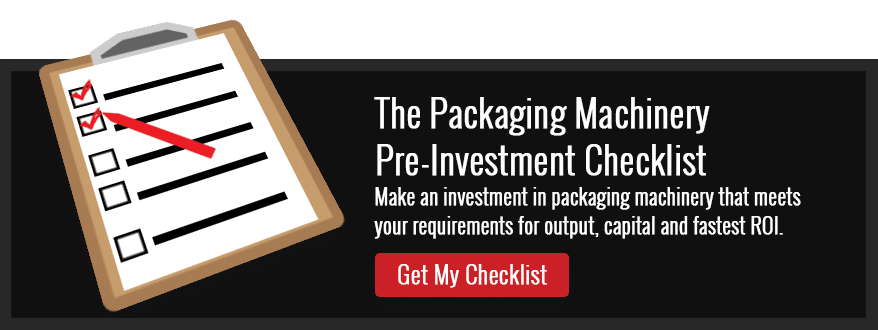What You Need To Know Before Upgrading Your Packaging Line
Equipment | The Business of Packaging | Technical Service and Support | Plant Performance | Investment | Food Packaging
Upgrading your packaging line can be incredibly beneficial to your production. If you’re thinking about upgrading any part of it, your packaging machinery is a great place to improve efficiency and reduce costs in several ways.
Here are the top 5 things to consider when upgrading your packaging line to ensure you’re on the path to success.
1. Find Your Biggest Pain Point
Write down a list of pain points you are experiencing along with why they are a pain point and how resolving them can make the company more money/more efficient. You may not have many, and you may have a few pages, but it's important to identify and acknowledge all of them.
Audit your packaging line as a whole and identify the machinery that has given you the most grief over the past year. Extensive breakdowns, and costly repairs can do a number on productivity and meeting deadlines. Take into consideration the causes of re-wraps and damaged goods.
Do your machine operators and line-workers do repetitive work that automation could handle? This is another opportunity for improving your efficiencies and reducing costs.
An easy win here is at the very end of your production line, the pallet wrapping! Manual pallet wrapping is a tough job, especially as your business grows. This part of your production line has huge potential to improve productivity and efficiency. Automation here is often inexpensive and can pay itself off in under a year, with less manual labor and dizzy employees.
Once your list is complete you should prioritize the severity of all of them. This can help you identify the most effective place to begin with upgrades.
A few common considerations our Packaging Solutions Specialists hear most often include space, labor, and capacity issues.
Space
One of the main factors that leads to the need for machinery upgrades is limited space. If your business has grown beyond your facility capacity, you start to run into storage problems and a slew of safety issues for your labor force.
Consider automating some or all of your packaging processes to eliminate the squeeze. Newer machinery is often built more compact and more efficient. Automated machinery requires less hands on the production floor to complete a finished good, which can eliminate the safety concerns caused by limited space for your labor force.
Labor
As your products gain market share you are bound to notice the impact that additional labor has on your overhead costs and ultimately, your revenue. Labor force is a very common pain-point as employees are not the low-cost part of your production.
High demand for your products will require more shifts, and more people to help keep up with your customer requests.
Automating even one piece of your packaging line can pay itself back pretty quickly, especially when it comes to reducing your labor costs.
Analyze your labor costs for each part of the process and compare this with the estimated cost of an upgrade.
2. Acknowledge And Identify A Budget Range
This is one of the most important parts of your plan for automation! If you dive in headfirst with blind eyes to cost, you are likely to be shocked by sticker prices and dreamy packaging machinery that simply don't fit within your budget constraints.
Discuss your pain points with leadership (those in charge of allocating budgets) early on. Be prepared with some estimates on the expected impact that an automated piece of packaging machinery will have on your productivity. Think about how it will address the pain points so you can have a real conversation about capital investment to improve your overall operation.
Once a budget is identified, you want to keep the supplier you choose to work with aware of it. Otherwise you'll be looking at machinery that won't match your needs.
3. Know Your Requirements
You should purchase new packaging machinery that will fit your needs in the long term. Consider 5-10 years down the line, will the machinery you are upgrading to be able to support your bandwidth as you grow?
Will the new piece of equipment you are interested in improve productivity if this is a pain point?
Consider your product line and the marketplace. Are there any obstacles that your packaging will encounter in the next ten years that could require significant packaging design alterations that would impact your production line and the machinery you select?
The sustainability movement and the demands that Wal-Mart are placing on their product suppliers to be sustainable by 2025 are an important to include in your quest to upgrade. Will the machinery you utilize be able to run different, sustainable materials efficiently?
Are you impacted by the drive for personalization from consumers? You need to strive to achieve a quality customer experience with your packaging that adds value to your brand in order to thrive in a consumer-focused marketplace. Do you have multiple flavors or styles of the same product that require smaller runs.
If so, try finding machinery that is adaptable to easily change-over different labeling and packaging styles and dimensions quickly. Take into account your smallest and largest packaging dimensions when looking at a machine that can run products of multiple sizes continuously.
Do you have specific 'must-haves' for the new packaging machine; a specific brand of control panel or pneumatics, for example? The more thorough you are with explaining your needs, the better they will be met.
4. Talk With A Supplier That Understands Your Business
The more your packaging machinery supplier knows about your current production and your business as a whole, the better they will be able to assist with alterations to machinery to provide the greatest return on investment.
On the same note, if the supplier you are working with isn't discussing your pain points before you bring them up, and they aren't asking questions to learn more about your business -- are they really going to be able to provide you the best options available to meet or exceed your needs? If you don't feel supported by the supplier you're speaking with, follow your gut.
No production is the same, so don't fall into the assumption that a stranger to your business will be able to provide you with the best solution for you. Effective packaging solutions will be customized to your current process and your future vision for growth; but only if the supplier has total clarity from you before providing a solution.
5. Don't Buy Based On Price
The relationship you have with your supplier is an important consideration in your purchasing process. The value they provide you over the long-term can outweigh the additional cost by a long shot.
Lower costs seem attractive on paper, but do they take care of you long term? Be sure that the price you are paying for your machinery has the value that you will need to grow your business.
Will the supplier provide installation and training for your operators?
Do you have any length of ongoing technical support if needed?
What about a plan for preventative maintenance to keep the machine in good working order?
These value-added benefits can be huge in terms of savings when they are available, so don't skip the small additional cost to miss out on them.
In some cases you can even find additional savings with your machinery supplier if they also offer the packaging materials you will be using. If you are really lucky, you will be working with a supplier that can help you in multiple aspects of your production. Not only does this provide extra convenience, but discounts for multi-product purchases are not uncommon.
Long story short, don't simply buy based on price.
Making a capital investment in packaging machinery upgrades is a big step to growing your brand and your business, so it's of utmost importance to be prepared ahead of time. Understand the 5 topics above and how they relate to your operation and you will be on the road to success.
So, are you ready to prepare for your next packaging line upgrade? Get a copy of the Packaging Machinery Pre-Investment Checklist here, free!
About David Roberge
I am grateful to be part of the outstanding Industrial Packaging team. I am able to hang out with some of the most knowledgeable folks in the packaging industry. I feel even luckier that I am able to share that knowledge with you. I love learning, hiking, and growing people and teams both personally and professionally, and helping companies grow better.




